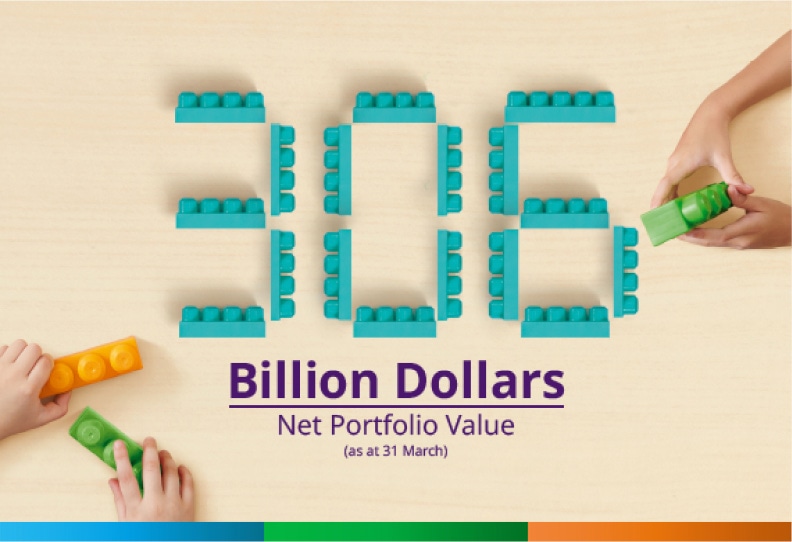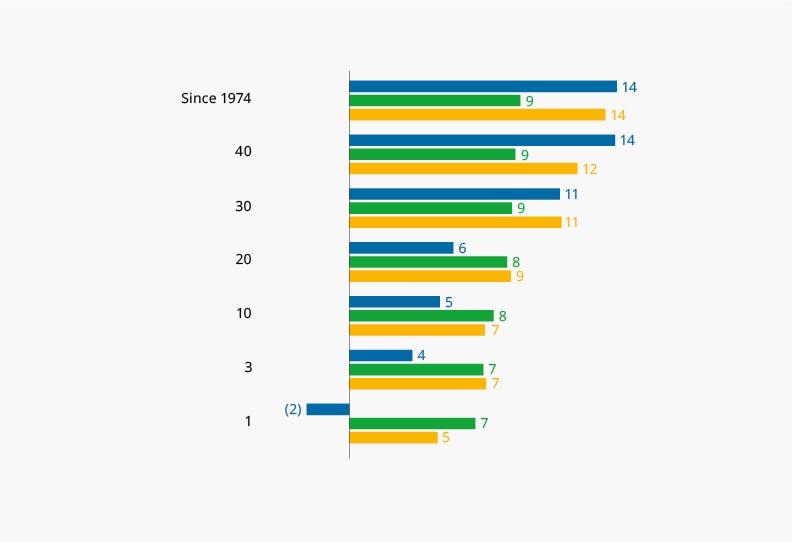Adopting International Accounting Standards
In 2018, Temasek adopted the International Financial Reporting Standards (IFRS), in line with Singapore’s convergence with IFRS. This included the adoption of IFRS 9: Financial Instruments in 2018 and IFRS 16: Leases in 2019.
Adoption of IFRS 16 Leases in 2019
The IFRS 16 accounting standard requires lessees to record all lease liabilities and right-of-use assets on the balance sheet. Prior to IFRS 16, operating leases were only required to be disclosed as off-balance sheet lease commitments.
Adoption of IFRS 9 Financial Instruments in 2018
The IFRS 9 accounting standard affects investments where we hold stakes of less than 20%.
Prior to IFRS 9, our income statements accounted for any realised gains or losses over the life cycle of our investments whenever we sold any of them. Year-to-year changes in market values of our sub-20% investments were captured in our balance sheet and had no impact on the reported profits or losses in our income statements.
With IFRS 9, year-to-year changes in the market value of all our sub-20% investments are now accounted as profits or losses in our income statements, even when no sale has occurred.
Sub-20% stakes comprise about 40% of our portfolio. Thus, the adoption of IFRS 9 will lead to material fluctuations in our reported profits or losses in our income statements due to the year-to-year paper gains or losses. Such market fluctuations do not reflect the potential gains or losses upon a sale.
With IFRS 9, Temasek’s Group net profit now includes:
of sub-20% Investments
Did you know?
Unrealised Gains or Losses
Share price movements in the market can result in changes in value. These are also known as paper gains or losses, or mark to market gains or losses.
Sub-20% Investments
These are minority investments where we have less than 20% shareholding.
Simulated Impact on Temasek’s Group Financials
The solid blue line in the chart below provides the audited Group net profit, under the Singapore Financial Reporting Standards which do not include mark to market gains or losses.
The dotted pink line provides the simulated Group net profit to include unrealised gains or losses of our sub-20% investments in a simple way.
The dark purple dots of 2020 and 2019 audited data include unrealised gains or losses of our sub-20% investments, based on the IFRS 9 accounting standard.
(for year ended 31 March)
Simulation of Group Net Profit 2009-2018 (S$b) with and without Unrealised Gains or Losses of Sub-20% Investments
- Audited Group net profit without unrealised gains or losses of sub-20% investments
- Simulated Group net profit with unrealised gains or losses of sub-20% investments
- Group net profit without unrealised gains or losses of sub-20% investments
- Audited Group net profit based on IFRS
Providing Additional Disclosures
To facilitate comparisons with past years’ Group net profits before the adoption of IFRS 9, we have provided additional disclosures in our Group Financial Summary:
- Unrealised gains or losses of sub-20% investments; and
- Group net profit, without unrealised gains or losses of sub-20% investments.
No Impact on Other Measures
IFRS 9 does not impact the following:
As an investor, we aim to deliver sustainable value over the long term. Hence, we focus on the performance of our portfolio over the longer time horizon, and the corresponding risk-adjusted cost of capital. We do not manage for year-to-year accounting profitability.
Adopting Accounting Standards Over the Years
Temasek adopts and complies with all applicable accounting standards in the preparation of group financials each year. The table below provides a snapshot of key accounting standards that we have adopted in our group financials since our inaugural issue of Temasek Review 2004:
| International Financial Reporting Standards (IFRS) or Singapore Financial Reporting Standards (SFRS) | How it impacts Temasek Group financials | Sectors in our portfolio impacted | Adoption by Temasek Group for financial year ended | |
|---|---|---|---|---|
| IFRS 16 | Leases | Requires lessees to record all lease liabilities and right-of-use assets on the balance sheet | All sectors | 31 Mar 2020 |
|---|---|---|---|---|
| IFRS 9 | Financial Instruments | Requires unrealised mark to market gains or losses of sub-20% investments to be included in the income statements | Financial services | 31 Mar 2019 |
| IFRS 1 | First-time Adoption of IFRS | Adopted IFRS, in line with Singapore’s convergence with IFRS to align with international accounting standards | Singapore-incorporated listed companies. Available for adoption by unlisted companies. | 31 Mar 2019 |
| IFRS 15 | Revenue from Contracts with Customers | Requires revenue to be recognised either over time or upon completion, according to when various promises in the sales contract are fulfilled. Impacts mainly long term construction and bundled contracts | Telecommunications, Industrials | 31 Mar 2019 |
| SFRS 41 | Agriculture | Upon acquisition of an agribusiness subsidiary, the Group adopted fair value accounting for biological assets (e.g. cattle and fruit trees), with changes in fair value included in the income statements | Agribusiness | 31 Mar 2015 |
| SFRS 40 | Investment Property | Adopted fair value accounting for investment properties, with changes in fair value included in the income statements | Real estate | 31 Mar 2008 |
| SFRS 39 | Financial Instruments: Recognition and Measurement | Introduced fair value accounting for sub-20% investments | Financial services | 31 Mar 2006 |



